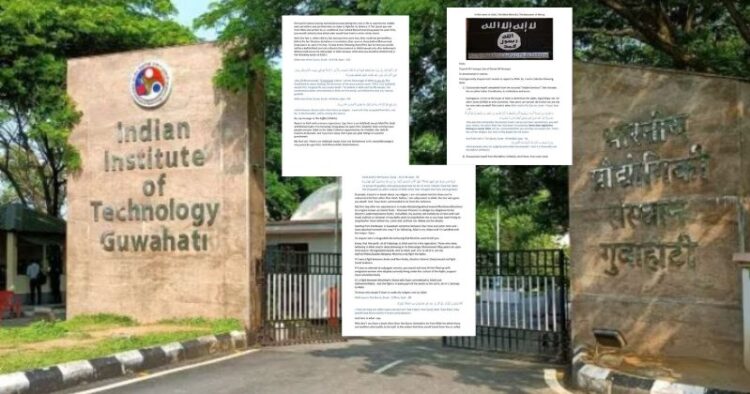Guwahati: In a startling turn of events, Tauseef Ali Farooqui, a fourth-year student at the prestigious Indian Institute of Technology Guwahati (IIT Guwahati), has reportedly joined the radical Islamic terrorist group ISIS. Farooqui’s departure from India to align with ISIS has sent shockwaves through academic circles and raised concerns about the influence of Islamist ideologies and radicalisation on educated youth.
The revelation of Farooqui’s radicalization came to light through an open letter posted on social media platforms. In this letter, titled ‘An Open Letter,’ Farooqui expressed his disavowal of Indian society, institutions, and land, denouncing them as part of a “Kafirs society.” He openly declared his allegiance to ISIS and his intention to participate in the group’s activities, framing it as a fight between Muslims and ‘Kafirs’ (infidels).
Farooqui’s letter contained chilling statements, including, “It’s a fight between Muslims (those who have surrendered to Allah) and Kafirs (infidels) and the fight is in every part of the world as the earth, all of it, belongs to Allah.” This proclamation not only revealed his radical beliefs but also underscored his determination to join the ranks of ISIS fighters.
Moreover, the letter outlined Farooqui’s planned travel route from Pan Bazaar in Guwahati to an undisclosed location where ISIS-controlled territory presumably awaits. Utilising selective interpretations of Quranic verses, Farooqui attempted to justify his actions and issued a call for non-believers to embrace Islam, warning of dire consequences for those who resist. Farooqi further wrote, “My message to the Kafirs, repent before Allah with sincere repentance. There is no God except Alllah and Mohammed is his messenger. Establish salat amongst your people and give Zakat. And if you turn away I will give you painful punishment.”
Amidst growing concerns over Farooqui’s radicalization, a significant breakthrough occurred on 20th March 2024 when the Assam Police Special Task Force (STF) successfully apprehended Harish Ajmal Farooqi, the head of ISIS in India, along with his associate Anurag Singh alias Rehan, in a meticulously planned operation conducted in Dhubri district.
This operation represents a crucial milestone in the fight against terrorism in the region. The arrest of these high-ranking ISIS operatives followed intelligence indicating their presence in a neighbouring country, with plans to infiltrate Indian territory via the Dhubri sector. The STF’s swift action and collaboration with national agencies, including the National Investigation Agency (NIA), led to the apprehension of these individuals.
Following their arrest, the ISIS terrorists were taken into custody by the NIA and transferred to Delhi for further investigation. This development underscores the urgent need for coordinated efforts to counter extremist ideologies and safeguard national security.
Link Between Farooqi and Farooqui:
Recently arrested ISIS India head Harish Ajmal Farooqi is known for his expertise in IED operations, terrorist recruitment, and indoctrination. Farooqi is a skilled recruiter, having enlisted dozens of youths into the fold of Islamic terrorist groups. Additionally, Farooqi is adept at indoctrination, using his persuasive techniques to radicalise individuals and incite them to join the jihad or engage in terrorist activities. His associate, Anurag Singh, also known as Rehan, who was apprehended with him in Dhubri, serves as a prime example of Farooqi’s indoctrination capabilities. Originally a Hindu from Sonipat, Haryana, Singh was allegedly persuaded by Farooqi to convert to Islam and subsequently became a prominent member of ISIS, underscoring Farooqi’s profound influence in the realm of radicalization and recruitment. May be the IIT Guwahati student Tauseef Ali Farooqui is another victim of radicalisation technique of terrorist Harish Ajmal Farooqi.
Farooqui’s case serves as a stark reminder of the multifaceted challenges posed by radicalization, particularly among educated youth. As authorities continue to investigate and address the root causes of extremism, the apprehension of key ISIS operatives marks a significant victory in the ongoing battle against terrorism. It also highlights the importance of proactive measures to prevent the spread of radical ideologies and protect society from potential threats.




















Comments